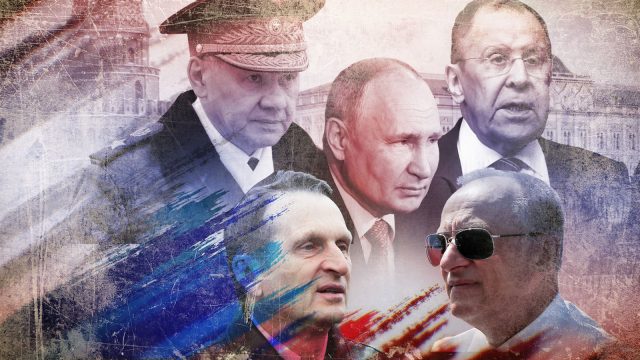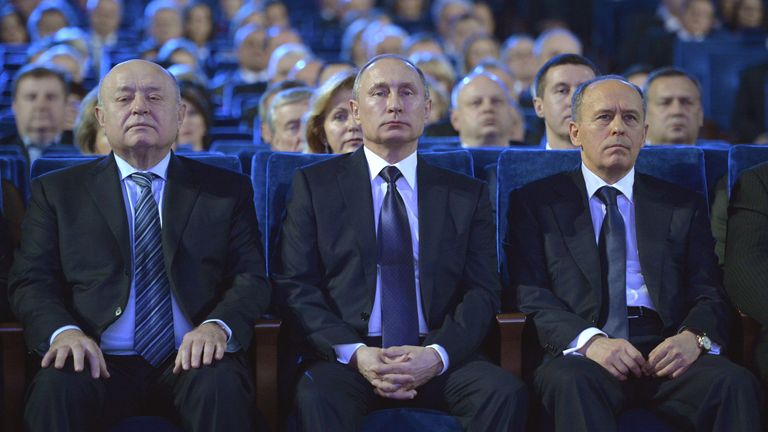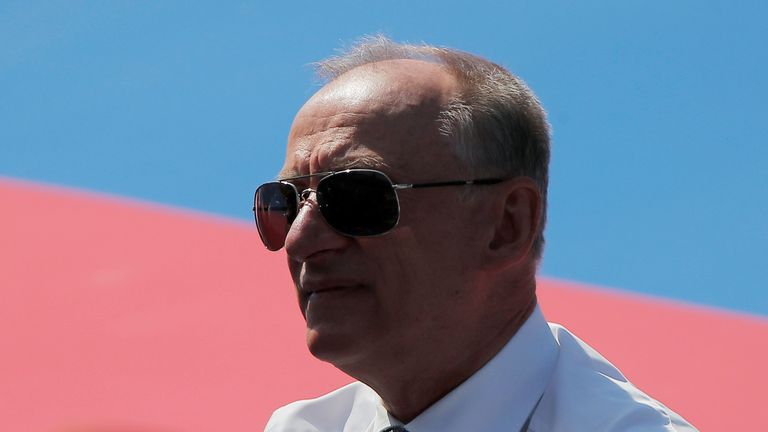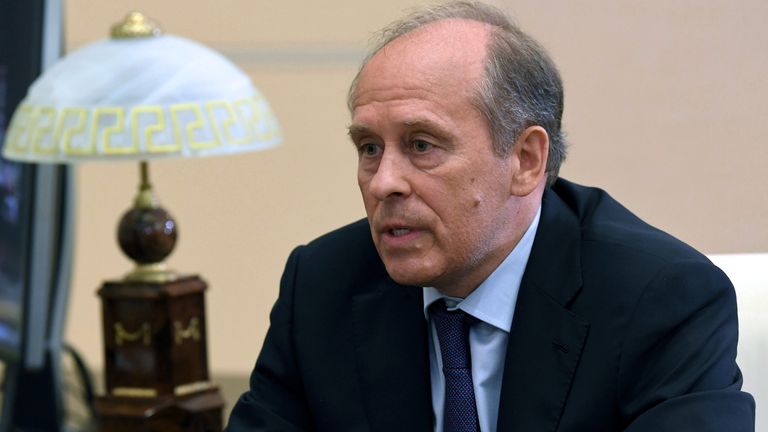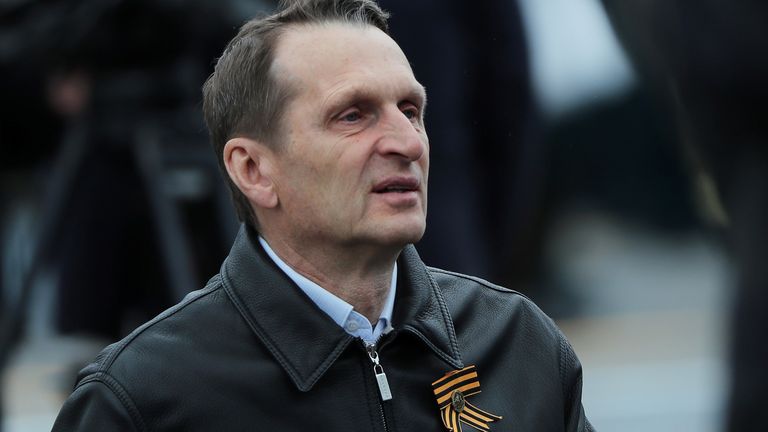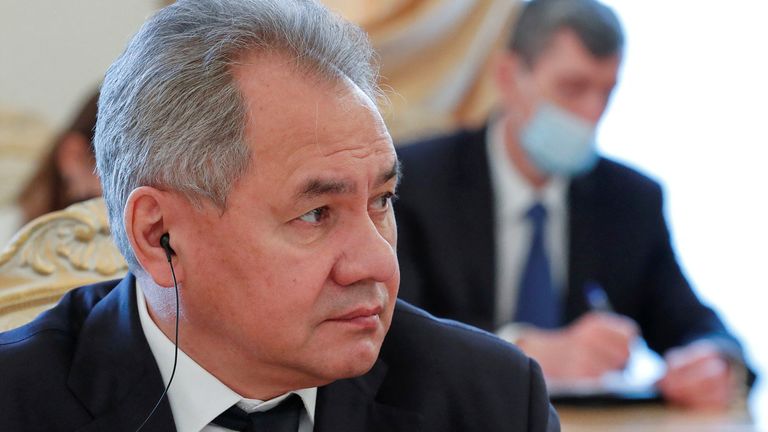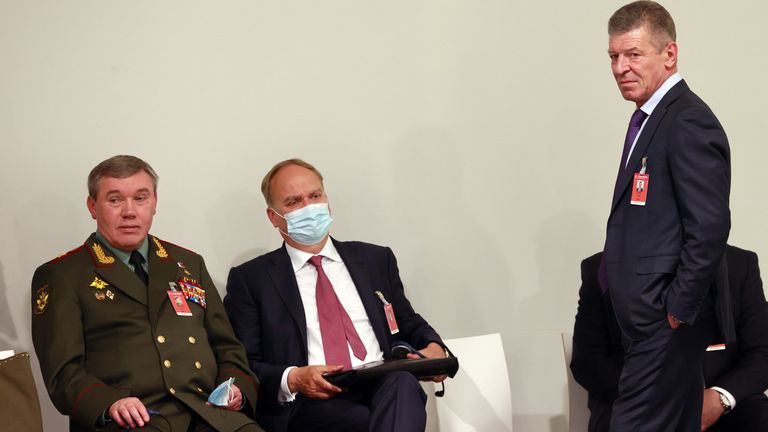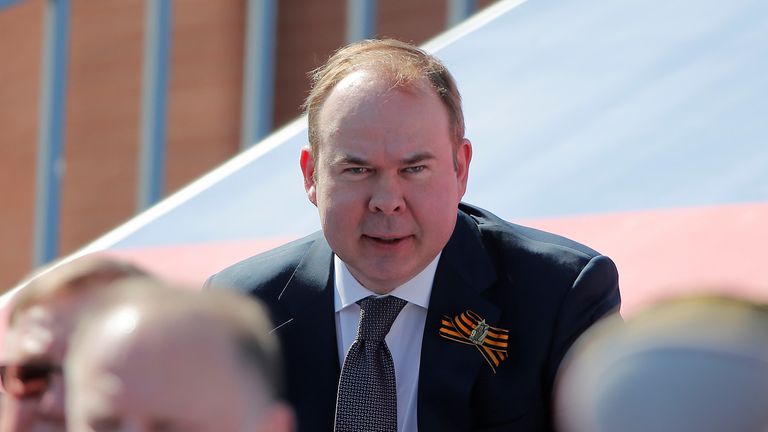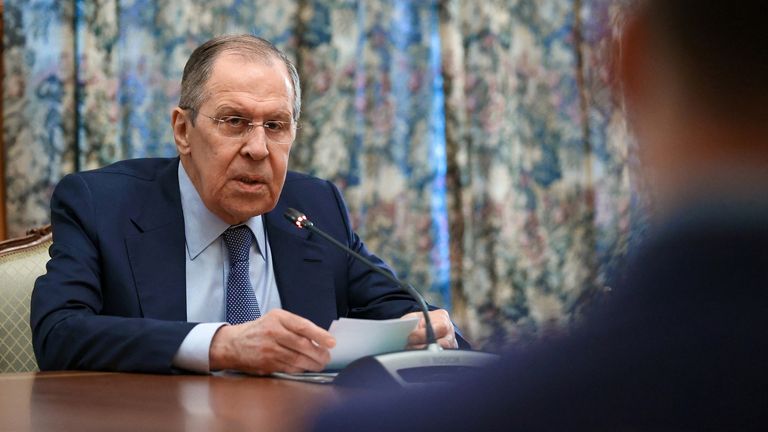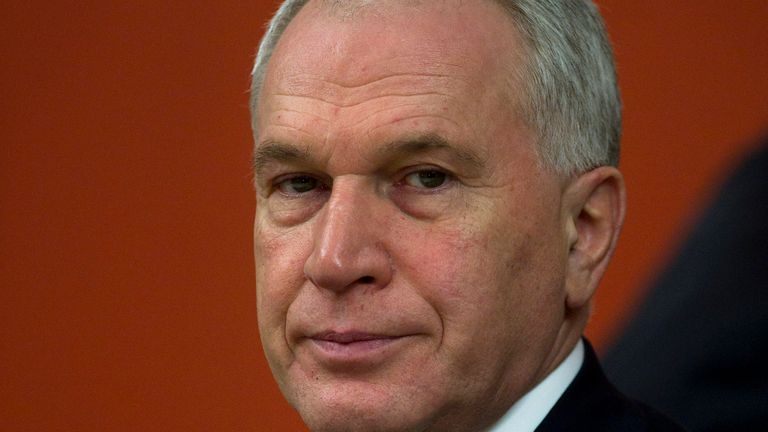Over his 20 years at the top of the Kremlin, Vladimir Putin has gathered an array of allies and associates.
So who’s close to the Russian president?
Follow latest: Two Russian regions turned into ‘active combat zones’
The siloviki
Let’s start with the siloviki – the security men around President Putin, most of whom rose up through the ranks of the KGB as he did and have a hawkish, Cold War mindset.
They believe themselves in an existential battle with the West where the ultimate goal of the US vis-a-vis Russia is regime change.
This is why their pitch on Ukraine is that this ‘special military operation’ is justified in defence of Russia and the Russian people.
They consider Ukraine a US proxy and see Russia’s invasion as a necessary step in preventing the US from destroying the Russian state.
In the last few years, their influence has grown as the president has shifted his focus from economic and social issues towards perceived security-related threats, including the crushing of civil society and internal dissent.
Nikolai Patrushev
Perhaps the most powerful of them all is Nikolai Patrushev, head of Russia’s Security Council.
He told Russia’s Kommersant newspaper in 2015 that “the US would prefer Russia not to exist at all as a country”.
In relation to the late opposition leader Alexei Navalny who died last month in jail, he claimed that “the West needs this figure to destabilise the situation in Russia, for social upheaval, strikes and new Maidans” (a reference to the 2013 uprising in Kyiv’s central square).
He was also reportedly the Kremlin’s informal delegate for the Balkans and is thought to have played a key role in orchestrating the coup in Montenegro in 2016, a bid to stop the country from joining NATO.
Alexander Bortnikov
Alexander Bortnikov is the current director of the FSB, Russia’s domestic intelligence agency and successor to the Soviet spy agency, the KGB.
As the head of perhaps the most important locus of power in the country, Bortnikov maintains an iron grip on Russian life and has been responsible for the tens of thousands of detentions and the dramatic tightening of restrictions on civil society which has gathered pace in recent years and especially since the start of the war.
It was the FSB who were discovered to be behind Mr Navalny’s poisoning and that of other regime opponents like Vladimir Kara-Murza, currently serving a 25-year sentence on treason charges.
Though responsible mostly for domestic affairs, Bortnikov may also fuel anti-Western sentiment around the president.
“We can imagine that he delivers to Putin on an everyday basis reports about hostile American influence or Western influence inside of Russia, and how Western secret services are trying to undermine political stability”, says Tatiana Stanovaya, a security expert and founder of political thinktank R.Politik.
“And he believes it.”
Sergei Naryshkin
Sergei Naryshkin is the head of the SVR, Russia’s Foreign Intelligence Agency. To a certain extent, the SVR plays second fiddle to the all-powerful FSB which also tramples on foreign turf.
Mr Naryshkin met Putin during their spy training days and was deployed to Brussels as a diplomat at the same time as Putin was sent as a young spy to Dresden.
Mr Naryshkin was publicly humiliated by the Russian president at a security council meeting just before the war began, as he stumbled to find the right words to give his support to independence for the separatist republics in eastern Ukraine.
But he seems to have clung on.
Sergei Shoigu
Sergei Shoigu is Russia’s defence minister and a close associate of Putin.
They go on widely-publicised hunting and shooting expeditions to Siberia together.
Shoigu is not a military man by training but since his appointment to the defence ministry in 2012 he has overseen Russia’s 2014 annexation of Crimea and its intervention in Syria.
“He’s a strong defender of the national interest but he doesn’t have the same visceral anti-Western feelings as the rest,” says Mark Galeotti of Mayak intelligence, an expert on Russia’s security agencies.
Valery Gerasimov
Army General Valery Gerasimov is Chief of the General Staff. He is an old-school Soviet general and experienced military strategist.
The Ukrainian invasion plan was Gen Gerasimov’s remit and he was widely perceived as having been responsible for Russia’s initial retreat from Kyiv in the first few weeks of the war and then the retreat from Kherson the following November.
President Putin tends to reward loyalty from his old guard over results and Gen Gerasimov has held onto his top military post even as other, perhaps more dynamic generals – Sergei Surovikin for one – have fallen by the wayside.
Anton Vaino
Anton Vaino is Chief of Staff of the Presidential Executive Office.
He keeps a low public profile but is supposed to be a highly efficient manager of the Kremlin administration, well-trusted by Putin to keep his affairs in order and his bureaucrats in line.
Sergei Kiriyenko
Sergei Kiriyenko is the Kremlin First Deputy Chief of Staff and has taken a much more prominent role since the war as a political strategist, with fingers in many pies.
He has been on the scene a long time, appointed Russia’s youngest ever prime minister for a brief five months under Boris Yeltsin in 1998 and nicknamed ‘Kinder Surprise’ for his baby face by the press.
He is known as a classic technocrat, but has been influential both in managing Russia’s administration of the occupied territories in Ukraine and political influence campaigns especially around the presidential election back home.
If President Putin chooses to reshuffle his government, there is an outside chance Mr Kiriyenko might return to that post he held so briefly in the late 1990s.
Sergei Lavrov
Sergei Lavrov has been Russia’s foreign minister since 2004. He is known as a wily, tough operator, charming when he wants to be, an arch-bully when he doesn’t.
He has been the face of Russian diplomacy as the country has moved from more westward-facing to aggressively anti-West.
Messaging around the geopolitical multipolar future, and Russia’s place in it, has fallen largely to him as he travels to those countries still prepared to invite Russia to the table.
Prominent as he is internationally, he is more of a messenger than key influencer over the Russian president.
There are also constantly circulating rumours, tricky to confirm, that he has been looking to retire for years.
Yuri Kovalchuk
Not to be overlooked, the unofficial close confidantes who are friends with President Putin.
Yuri Kovalchuk is a Russian oligarch with family and personal ties to the president.
They met when President Putin was deputy Mayor of what was then Leningrad, modern-day St Petersburg.
“He has never held any government position, but he’s obviously one of the most influential personalities in Russia and he is ideologically very close to Putin”, says Mikhail Zygar, author of All the Kremlin’s Men.
“He’s one of those who helped him create that universe of an imaginary empire that Russia needs to strike back against.”
The buck stops with Putin
We won’t know whose counsel played a key role in the Ukraine invasion but we understand it was a very limited circle, with even those considering themselves close to the president stunned by his decision to invade.
Given the interconnected nature of the Russian elites, bound together by financial and family ties – marriages, mistresses and money – there have been barely any elite defections.
Click to subscribe to the Sky News Daily wherever you get your podcasts
The instinct President Putin seems to be acting on comes from a broader shared mentality among the elites, passed on to broad swathes of the Russian people through vigorous propaganda, inherited from Cold War days.
That Russia is engaged in an existential battle with the United States and that survival justifies any action even if that includes a long campaign in Ukraine and a seemingly never-ending confrontation with the West.
“It’s not a worldview of a small and isolated group of the people”, says security analyst Valery Kashin.
“It’s a world view which is shared by a significant part of the Russian bureaucracy and security establishment.”

